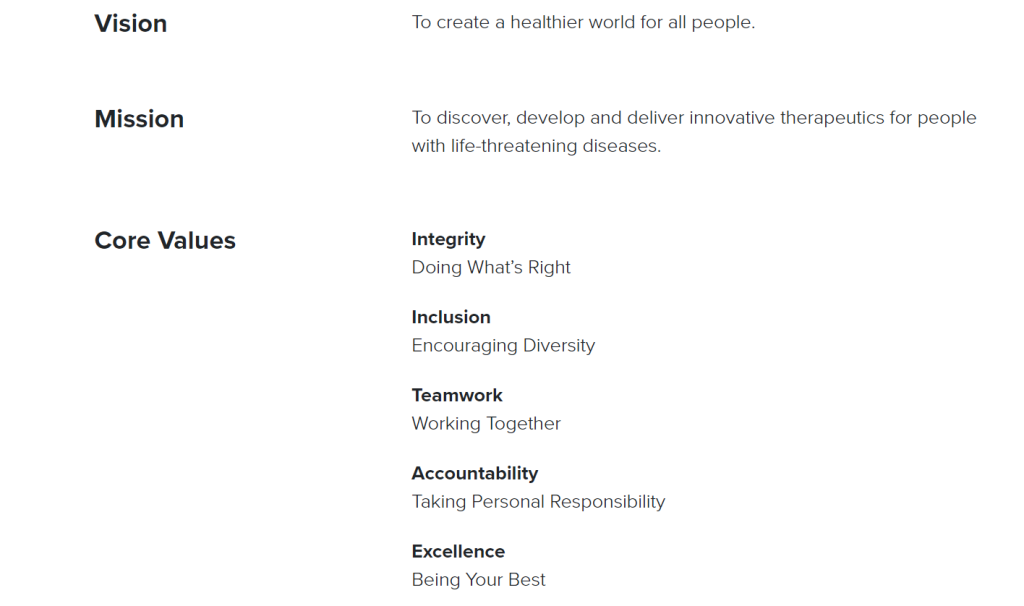Table of Contents
ToggleA Brief History of Gilead Sciences
Gilead Sciences, Inc. was founded in 1987 by Michael L. Riordan, a medical doctor, and a team of colleagues. The company started with a focus on discovering, developing, and commercializing innovative medicines in areas of unmet medical need. In 1992, Gilead went public and continued to expand its pipeline of products in the areas of HIV/AIDS, liver diseases, and other serious medical conditions.
In 2001, Gilead received FDA approval for its breakthrough antiretroviral medication, tenofovir disoproxil fumarate (Viread), which would become a cornerstone of HIV treatment. Over the years, the company continued to invest in research and development, leading to the introduction of several more successful drugs, including Truvada, Atripla, Stribild, and Harvoni, among others.
In 2017, Gilead acquired Kite Pharma, a leader in cell therapy, and became a pioneer in the development of CAR-T therapy for cancer treatment. The company has also expanded its focus on nonalcoholic steatohepatitis (NASH), inflammation, and other areas of unmet medical need.
Today, Gilead Sciences, Inc. is a global biopharmaceutical company with a diverse portfolio of products and a continued commitment to addressing the world’s most pressing health challenges. The company is headquartered in Foster City, California, and continues to be a leader in the development of innovative medicines.
Who Owns Gilead Sciences?
Gilead Sciences, Inc. is a biopharmaceutical company that develops and commercializes therapeutics in the areas of HIV/AIDS, liver diseases, and other serious illnesses. The company is publicly traded, and its ownership is spread out among a diverse group of shareholders. As of the most recent data available, the top 10 institutional shareholders of Gilead Sciences, Inc. are The Vanguard Group, Inc., BlackRock, Inc., State Street Corporation, Capital Research & Management Co., SSgA Funds Management, Inc., Wellington Management Company, LLP, Fidelity Management & Research Co., T. Rowe Price Associates, Inc., and Geode Capital Management, LLC. These institutional investors collectively own a significant portion of the company and play a significant role in its governance and decision-making processes.
Gilead Sciences Mission Statement

Gilead Sciences, Inc.’s mission statement is to advance the care of patients suffering from life-threatening diseases worldwide. With a focus on innovative research and development, Gilead is committed to providing access to high-quality, affordable medications that have the potential to make a real difference in the lives of those affected by serious illnesses. The company strives to continuously improve and expand its product offerings, while also seeking to make a positive impact on global public health through their work.
How Gilead Sciences Makes Money?
Gilead Sciences, Inc. operates with a focus on developing and selling pharmaceutical products, particularly in the areas of antiviral and antiproliferative therapies. The company generates its revenue primarily through the sale of its flagship products, such as antiviral drugs for the treatment of HIV/AIDS and hepatitis B and C. Additionally, Gilead Sciences, Inc. earns revenue through partnerships and collaborations with other companies for the licensing and distribution of its products. The company’s business model is centered around the development and commercialization of innovative therapies to address unmet medical needs.
Gilead Sciences Business Model Canvas
The Business Model Canvas is a strategic management tool that provides a visual representation of a company’s business model, outlining the key elements that drive its success. These elements include the customer segments the company serves, the value propositions it offers, the channels through which it delivers its products or services, the customer relationships it cultivates, the revenue streams it generates, the key resources and activities it relies on, the key partners it collaborates with, and the cost structure it operates within.
Customer Segments:
– Gilead Sciences, Inc. primarily serves healthcare providers, hospitals, pharmacies, and patients in need of therapeutic solutions for infectious diseases, liver diseases, oncology, and other serious medical conditions. The company also targets government health agencies and payers.
Value Propositions:
– Gilead offers innovative and effective treatments for life-threatening diseases, including antiviral medications for HIV and hepatitis, groundbreaking therapies for cancer, and novel approaches to liver disease management.
Channels:
– Gilead distributes its products through a combination of direct sales to healthcare providers, wholesalers, and pharmacy networks, as well as strategic partnerships with distributors and specialty pharmacies. The company also utilizes digital platforms to engage with patients and healthcare professionals.
Customer Relationships:
– Gilead builds relationships with healthcare providers through direct sales, educational programs, and ongoing support services. The company also engages patients through disease awareness campaigns, patient assistance programs, and personalized support resources.
Revenue Streams:
– Gilead generates revenue from the sales of its pharmaceutical products, including prescription medications and over-the-counter treatments, as well as licensing and collaboration agreements with other biopharmaceutical companies.
Key Resources:
– Gilead’s key resources include its research and development capabilities, intellectual property portfolio, manufacturing facilities, distribution networks, marketing and sales teams, and a diverse workforce of scientists, clinicians, and business professionals.
Key Activities:
– Gilead’s key activities involve ongoing research and development efforts to advance its pipeline of drug candidates, clinical trials to demonstrate the safety and efficacy of its products, regulatory submissions and approvals, manufacturing and supply chain operations, marketing and sales activities, and partnerships, and collaborations with other stakeholders in the healthcare ecosystem.
Key Partners:
– Gilead partners with academic institutions, research organizations, contract manufacturing organizations, medical associations, patient advocacy groups, government agencies, and other biopharmaceutical companies to advance its scientific discoveries, clinical development programs, and commercialization efforts.
Cost Structure:
– Gilead’s cost structure includes expenses related to research and development, manufacturing and distribution, sales and marketing, regulatory compliance, intellectual property protection, clinical trials, and general administrative functions. The company also incurs costs associated with strategic partnerships and licensing agreements.
Gilead Sciences’s Competitors
Gilead Sciences, Inc. is a biopharmaceutical company that develops and commercializes therapeutics for various medical conditions, including HIV, hepatitis B, and hepatitis C. The company faces stiff competition from other pharmaceutical companies in the industry. Some of Gilead Sciences, Inc.’s top competitors include:
1. AbbVie Inc.
2. Bristol-Myers Squibb Company
3. Merck & Co., Inc.
4. Johnson & Johnson
5. Pfizer Inc.
Gilead Sciences SWOT Analysis
Strengths:
1. Strong portfolio of innovative drugs and potential blockbusters
2. Leadership position in HIV treatment and liver diseases
3. Robust pipeline of novel therapies targeting cancer, inflammation, and fibrosis
4. Established partnerships with pharmaceutical companies for drug development
5. Strong financial performance and stability
Weaknesses:
1. Dependence on a few key products for a significant portion of revenue
2. Limited success in developing drugs for certain disease areas
3. Legal and reputational challenges related to patent disputes and pricing issues
4. Limited presence in emerging markets
Opportunities:
1. Expansion of product portfolio through acquisitions or partnerships
2. Growth in the biopharmaceutical industry through advancements in personalized medicine and gene therapy
3. Expansion into new therapeutic areas such as rare diseases and autoimmune disorders
4. Focus on developing drugs for emerging markets
Threats:
1. Intense competition from generic drug manufacturers
2. Increasing regulatory scrutiny and pricing pressures
3. Potential impact of healthcare reform and changes in reimbursement policies
4. Failure of pipeline candidates to gain regulatory approval or achieve commercial success
Concluding Analysis
In summary, Gilead Sciences, Inc. has established a strong reputation in the pharmaceutical industry with its innovative business model and successful development of life-saving drugs. The company’s focus on research and development, strategic partnerships, and commitment to tackling global health challenges have positioned it for continued success in the future. As an analyst, I am optimistic about the potential for Gilead Sciences, Inc. to further diversify its product pipeline, expand its reach into new markets, and drive continued growth in the coming years. With an impressive track record of success and a strong foundation in place, I believe that Gilead Sciences, Inc. is well-positioned to remain a leader in the pharmaceutical industry for years to come.
Additional Resources
To keep learning and advancing your career, we highly recommend these additional resources:
Business Model Canvas of The Top 1,000 Largest Companies by Market Cap in 2024
A List of 1000 Venture Capital Firms & Investors with LinkedIn Profiles
Peter Thiel and the 16 Unicorns: The Legacy of Thiel Fellowship












